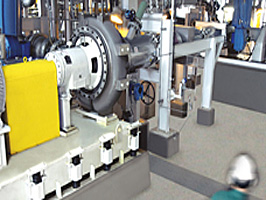 ANDRITZ continuous Lo-Solids cooking for tailored pulp production – the preferred cooking technology
ANDRITZ continuous Lo-Solids cooking for tailored pulp production – the preferred cooking technology
There have been numerous upgrades of the ANDRITZ continuous Lo-Solids cooking to enhance specific customer solutions. The flexibility included in an ANDRITZ cooking system is unmatched by competitive offerings.
The challenge
Raw material variability is one of the key challenges of pulp producers. In addition, final product specifications can vary based on customer preferences. Improving quality while reducing both raw material consumption and environmental impact are a must for any pulp supplier.
The solution
The Lo-Solids cooking process from ANDRITZ is flexible by design to accommodate raw material variations while producing pulps of exceptional quality and high yield. By focusing our development efforts on the key challenges of the process, ANDRITZ has developed a technology that can be adapted to any number of raw materials or pulp products.
Diamondback chip pre-steaming
The efficient removal of air around and within the wood chip is the key to improved and rapid impregnation ability. The diamondback technology with its unique and simple design offers maximum results with no moving parts.
TurboFeed chip feeding
Process simplification by reducing equipment and controls has led to the replacement of high-pressure feeders with specially designed pumps that transport the impregnated chips to the top of the reaction vessels. Due to their rotor geometry, chip pumps effectively pressurize the system without creating mechanical forces on the chips, therefore preserving fiber strength.
Digester vessel with Lo-Solids cooking
Lo-Solids cooking principles have been applied on over 80 systems of various wood species, making different pulp specifications. This includes digesters that change wood species from softwood to hardwood or simply change their wood mix blend over time. Online measurements and controls allow operators to maintain optimum pulp properties by varying process conditions throughout the cooking vessel. Advanced control technologies can be applied to further enhance quality and performance.
Recovered steam technology
While the traditional standard used some form of cyclone to recover energy from the digester extraction liquor (flashed steam), modern technology allows for several methods for recovering this energy while improving gas handling safety. Secondary heat balance calculations can be included in the analysis to optimize the overall mill energy balance. Among the options are kettle reboilers, vapor reboilers, special heat exchangers, and digester evaporators.
Laboratory simulation and investigation
ANDRITZ can perform realistic simulations of any industrial cooking process, including those modified by customers. Lab studies are a low-risk and low-cost way of determining the impact of changing conditions: either in raw materials, utilities, or process optimization. Work with external customers is treated confidentially.
ANDRITZ - Graz - AUSTRIA - 20 agosto 2014
